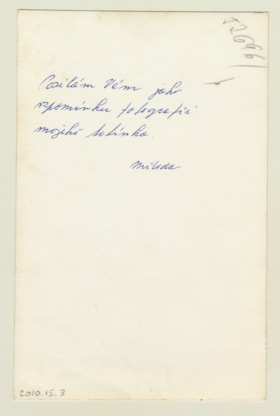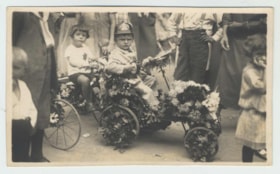Narrow Results By
Jewish wrestling world champion Kopecky
https://www.cjhn.ca/link/cjhn76600
- Collection
- Montreal Holocaust Museum
- Description Level
- Item
- Material Type
- graphic material
- Physical Description
- Photograph : Paper : b&w ; Ht: 13,7 cm x W: 8,8 cm
- Collection
- Montreal Holocaust Museum
- Description Level
- Item
- Material Type
- graphic material
- Physical Description
- Photograph : Paper : b&w ; Ht: 13,7 cm x W: 8,8 cm
- Other Title Information
- Documentary Artifact
- Language
- Czech
- Notes
- B&w portrait of young man posing in wrestling pose, arms at an angle and fists closed. One medal is hanging by a ribbon around his neck and 4 medals pinned to his outfit. Narrative: The wrestler came from Cesky Brod, the donor's hometown.
- Accession No.
- 2010.15.03
- Name Access
- Novak, Georges
- Archival / Genealogical
- Archival Descriptions
- Repository
- Montreal Holocaust Museum
Images
Jägerkaserne
https://www.cjhn.ca/link/cjhn51201
- Collection
- Montreal Holocaust Museum
- Description Level
- Item
- Material Type
- graphic material
- Physical Description
- Drawing : paper : Sketch : Ink; Pencil : Black, White ; Ht: 5,75 in. x W: 8 in.
- Collection
- Montreal Holocaust Museum
- Description Level
- Item
- Material Type
- graphic material
- Physical Description
- Drawing : paper : Sketch : Ink; Pencil : Black, White ; Ht: 5,75 in. x W: 8 in.
- Other Title Information
- Original Art, Work on Paper
- Creator
- -
- Physical Condition
- Excellent
- Notes
- Drawing depicts inside a dormitory in ghetto-camp of Terezin. Piled mattresses with two children sleeping on the edge of the pile and two adults huddled in a corner. The scene shows the last night in the Terezin Jägerkaserne for this group prior to their deportation to a killing centre Narrative: The Jägerkaserne was used as quarters for old people during the ghetto period. In addition, it served as a quarantine station for the disinfestation of personal belongings.
- Accession No.
- 2011X.62.02
- Name Access
- Novak, Georges
- Archival / Genealogical
- Archival Descriptions
- Repository
- Montreal Holocaust Museum
Images
Jiricek and Hana Novak in children's parade
https://www.cjhn.ca/link/cjhn78319
- Collection
- Montreal Holocaust Museum
- Description Level
- Item
- Material Type
- graphic material
- Physical Description
- Photograph : Paper ; Ht: 3 1/8 in. x W: 5 1/4 in.
- Date
- September 5, 1926
- Collection
- Montreal Holocaust Museum
- Description Level
- Item
- Material Type
- graphic material
- Physical Description
- Photograph : Paper ; Ht: 3 1/8 in. x W: 5 1/4 in.
- Other Title Information
- Documentary Artifact
- Date
- September 5, 1926
- Physical Condition
- Good
- Language
- Czech
- Notes
- b&w, outdoor. Two children sibilings Jiricek (Georges) and Hana Novak are sitting on a toy car decorated with plants and flowers. Jiricek is dressed as a firefighter and Hana is sitting on tricycle behind him, she has a star on her shirt. Narrative: Georges Novak was born Jiricek Pick on 1923-08-06 in Cesky Brod (Czech Republic, then Czechoslovakia). Georges' father, Vladimir, owned a large textile mill and factory that employed 400 people. His mother was an accomplished opera singer. George and his sister Hana were brought up in a Catholic home as Georges’ father had converted to Catholicism. Georges' father's Jewish identity was not revealed until the Germans identified him as a Jew. On 1939-03-15, the German Army invaded their hometown. In 1940, Georges was classified as a Jew according to the Nuremberg Laws and was forbidden to attend school. In 1941, he moved to Prague where he studied book binding. Georges' father was imprisoned by the Gestapo. In Prague, Georges was falsely arrested for sabotage and sentenced to life in prison. He spent two years at Lipa camp. He described it as a farm with livestock and a vegetable garden where Georges was guarded by a German couple. On 1943-09-13, Georges was transferred to Theresienstadt ghetto-camp. There, he was sent to a military prison called Kleine Festung. During the day, Georges was assigned to work in the garden and was able to smuggle vegetables into the ghetto-camp. In 1945-05, the Soviet Army liberated Theresienstadt. Georges escaped from the Russians and went to Prague where he attended medical school at Charles University. He learned that his parents and his sister had been deported in 1942 and were murdered in Auschwitz. Georges immigrated to Montreal alone in 1949.
- Accession No.
- 2011X.62.14
- Name Access
- Novak, Georges
- Archival / Genealogical
- Archival Descriptions
- Repository
- Montreal Holocaust Museum
Images
Sokol movement youth group
https://www.cjhn.ca/link/cjhn78320
- Collection
- Montreal Holocaust Museum
- Description Level
- Item
- Material Type
- graphic material
- Physical Description
- Photograph : Paper ; Ht: 3 3/8 in. x W: 5 1/4 in.
- Date
- 1930
- Collection
- Montreal Holocaust Museum
- Description Level
- Item
- Material Type
- graphic material
- Physical Description
- Photograph : Paper ; Ht: 3 3/8 in. x W: 5 1/4 in.
- Other Title Information
- Documentary Artifact
- Date
- 1930
- Physical Condition
- Good
- Notes
- b&w, outdoor, group photo of boys in uniform posing in front of a building's doors. A man holding a flag is standing on the right side. George (Jiricek) Novak is standing fourth from the left on the middle row. Narrative: Georges Novak was born Jiricek Pick on 1923-08-06 in Cesky Brod (Czech Republic, then Czechoslovakia). Georges' father, Vladimir, owned a large textile mill and factory that employed 400 people. His mother was an accomplished opera singer. George and his sister Hana were brought up in a Catholic home as Georges’ father had converted to Catholicism. Georges' father's Jewish identity was not revealed until the Germans identified him as a Jew. On 1939-03-15, the German Army invaded their hometown. In 1940, Georges was classified as a Jew according to the Nuremberg Laws and was forbidden to attend school. In 1941, he moved to Prague where he studied book binding. Georges' father was imprisoned by the Gestapo. In Prague, Georges was falsely arrested for sabotage and sentenced to life in prison. He spent two years at Lipa camp. He described it as a farm with livestock and a vegetable garden where Georges was guarded by a German couple. On 1943-09-13, Georges was transferred to Theresienstadt ghetto-camp. There, he was sent to a military prison called Kleine Festung. During the day, Georges was assigned to work in the garden and was able to smuggle vegetables into the ghetto-camp. In 1945-05, the Soviet Army liberated Theresienstadt. Georges escaped from the Russians and went to Prague where he attended medical school at Charles University. He learned that his parents and his sister had been deported in 1942 and were murdered in Auschwitz. Georges immigrated to Montreal alone in 1949.
- Accession No.
- 2011X.62.15
- Name Access
- Novak, Georges
- Archival / Genealogical
- Archival Descriptions
- Repository
- Montreal Holocaust Museum
Images
{{ server.message }}






